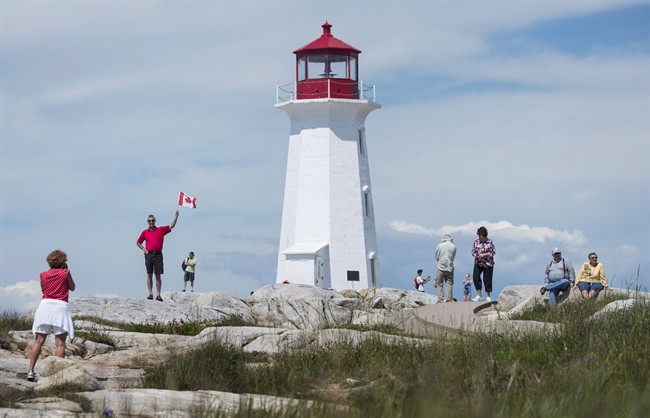Nova Scotia may be the second smallest province geographically, but it is big on lighthouses.

With about 150 lights scattered along its dangerously ragged coastline, it boasts more lighthouses than any other province.
But it wouldn’t be a stretch to suggest most Canadians would be hard pressed to name one of these beacons, apart from postcard-perfect Peggy’s Cove.
In fact, there are plenty of other lighthouses worth visiting for their scenic beauty, historic maritime charm, quirky gift shops and – at two locations – comfy, seaside accommodations.
1. Cape d’Or: Remote, rugged and romantic
Perched on a finger of rock that extends into a turbulent section of the Bay of Fundy, this remote lighthouse is surrounded by some of the most spectacular scenery in the province. Sheer cliffs, rocky beaches and the bay’s ever-changing moods contribute to a sense of isolation.
But the two lightkeepers’ houses nearby, built in the late 1950s and restored in 1995, offer refuge for travellers when the weather inevitably closes in and the foghorn starts its mournful refrain.
One of the red-roofed houses has been converted to a four-bedroom inn, complete with ocean views from every window. The other building is the Lightkeeper’s Kitchen, a casual restaurant that offers home-cooked meals including chowders, soups, pan-fried fish, salads, sandwiches and desserts.
http://www.capedor.ca
2. Cape Forchu: The ‘apple core’ attracts adventurous foodies
- Posters promoting ‘Steal From Loblaws Day’ are circulating. How did we get here?
- Video shows Ontario police sharing Trudeau’s location with protester, investigation launched
- Canadian food banks are on the brink: ‘This is not a sustainable situation’
- Solar eclipse eye damage: More than 160 cases reported in Ontario, Quebec
Easily Nova Scotia’s most unusual lighthouse, Cape Forchu’s slender, “apple-core” design was initially despised by locals when it was built in 1962 to replace a traditional wooden structure.
In 1993, the austere 23-metre concrete tower became Nova Scotia’s last staffed lighthouse.
Today, it remains the province’s only fully intact and operating light station that is open to the public.
Located on a rocky headland at the western entrance to Yarmouth’s busy harbour, the impeccably maintained facility includes a large lightkeeper’s house, built in 1912 and later transformed into a
museum, and a small restaurant at the base of the light.
The light station is also the focal point of the Lightkeeper’s Seafeast, a “dining adventure” that features a tour aboard a Cape Islander fishing boat – complete with oysters and wine – a sunset lobster supper at the lighthouse, Acadian music and a tour of the night sky.
http://www.capeforchulight.com/
3. Gilberts Cove
Cozy refuge for beachcombers Billed as the “Greatest little lighthouse in Canada,” Gilberts Cove is remarkable for its picturesque setting on St. Marys Bay, its unusually stout frame and its inviting tea room and gift shop.
The lighthouse, built in 1904, is considered an architectural treasure because its lantern room – the glassed-in housing for the light – sits atop the lightkeeper’s house, a rarity even in Atlantic
Canada.
Its sturdy proportions have made this lighthouse a favourite among photographers.
Open from mid-June to mid-September, the grounds are well suited for picnics, beachcombing at low tide and watching spectacular sunsets.
http://www.gilbertscovelighthouse.com
4. Port Bickerton: Maritime gem features lightkeeper’s cottage
There are actually two lighthouses at Port Bickerton: a utilitarian concrete light station that is still operational, and a restored, wood-frame lighthouse that is now home to the Nova Scotia Lighthouse Interpretive Centre.
The site’s renovated lightkeeper’s residence, built in 1960, is available as a weekly rental cottage during the summer, and there’s no extra charge for the stunning sunrises over the North Atlantic.
Located on a steep bluff along Nova Scotia’s rugged eastern shore, the older lighthouse was built in 1930 and is similar in design to Gilberts Cove – its snug lantern room also accessible to the public.
As well, the rocky, windswept headland is crisscrossed with walking trails.
http://www.portbickertonlighthouse.ca
5. Fort Point: Historic, hunchbacked harbour light
One of the oldest lighthouses in Nova Scotia can be found at Fort Point at the end of Main Street in Liverpool, along the province’s popular southwestern shore.
It’s original brass lanterns burned seal oil.
Named after the fortified battery that protected the town, this “hunchbacked” harbour light was built in 1855 to guide merchant ships during the booming timber trade.
The Fort Point Lighthouse Museum, gift shop and five-metre tower are open to the public in the summer.



Comments